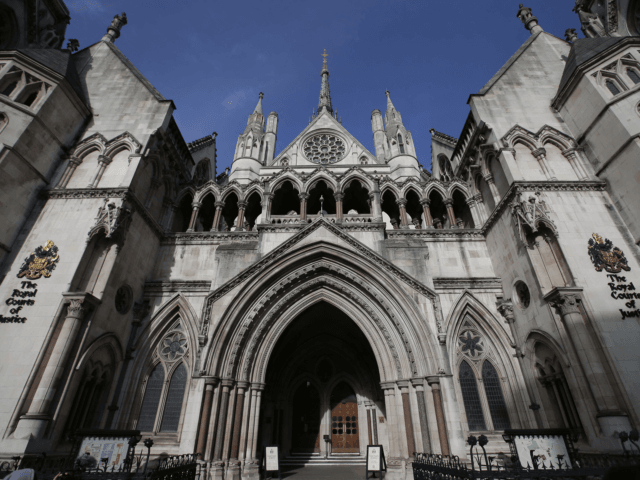Former police officer Harry Miller won a legal victory against the British police’s policy to classify traditional views on gender as “hate incidents”.
Harry Miller won a legal challenge against the College of Policing in the Court of Appeal on Monday over the lawfulness of the College’s guidelines on “non-crime hate crimes”.
The British court ruled on Monday that in Miller’s case the police acted “unlawfully”.
In January of last year, the ex-cop received a phone call from Humberside Police and was told that following an anonymous complaint he was being investigated for having shared 30 “transphobic” post on Twitter.
One of the tweets read: “I was assigned mammal at birth, but my orientation is fish. Don’t mis-species me”. Another stated that trans-women aren’t women.
The police concluded that no crime had been committed, however, it was still recorded as a “non crime hate incident” and the police phoned Miller to “check” his “thinking”.
In an interview with Breitbart London in 2019, Miller said: “I told [the investigating officer] about George Orwell’s Nineteen Eighty-Four. I said it was a dystopian novel, not a set of police guidelines.”
In Britain, the police have the power to record so-called non-crime hate incidents in criminal databases, resulting in the non-offences being discoverable in background checks, which have the potential to interfere with an individual’s employment opportunities, even though no crime was committed.
The College of Policing’s guidance defines a non-crime hate crime as such: “A non-crime hate incident is an incident that is perceived by the victim or any other person to be motivated by hostility or prejudice based on a person’s race, religion, sexual orientation, disability or transgender status.
Delingpole — Watch: Ex-Cop Harry Miller Sues Police over ‘Transphobic’ ‘Non-Crime Hate Incident’ https://t.co/BKzRS0VXOS
— Breitbart London (@BreitbartLondon) November 23, 2019
In response to his treatment by the police, including being visited at his place of work, Mr Miller took it upon himself to dispute the police’s use of the ‘non-crime hate crime’ guidance by taking the police to court.
Following Mr Miller’s first court case, the College of Policing’s guidance was updated to include “a strong warning against police taking a disproportionate response to reports of a non-crime hate incident”.
However, Dame Victoria Sharp, the senior judge presiding over the appeal stated: “In my opinion [the revisions] do not go very far or not nearly far enough to address the chilling effect of perception-based recording more generally”.
She added: “There is nothing in the guidance about excluding irrational complaints, including those where there is no evidence of hostility and little, if anything, to address the chilling effect which this may have on the legitimate exercise of freedom of expression.”
While the guidance has remained largely intact, bar some minor reforms, Mr Miller was able to win a legal challenge against the police and their actions against him were branded as “unlawful”.
The ruling will likely be helpful to individuals who are targeted by the police over ‘non-crime hate incidents’ in the future, as they will able to challenge the police’s actions in court, as previously individuals were unable to appeal the classification directly with police forces.
‘Dislike’ and ‘Unfriendliness’ Can Be Hate Crimes, UK Police Confirm
https://t.co/UMwDGHW2YM— Breitbart London (@BreitbartLondon) October 25, 2017
In response to the court’s ruling Assistant Chief Constable Iain Raphael, a spokesperson from the College of Policing, said in a statement: “The judgement provides clarity that police have the power to record, retain and use a wide variety of data and information to keep people safe.
“By recording correctly, the police can gain insight into potential tensions in communities and harm caused to individuals.
“All police guidance is kept under continual review and is adapted to keep pace with the complex demands of protecting the public.”
Speaking to Breitbart London, GB News Presenter and director of Reasoned UK, Darren Grimes said he was “delighted” with Harry Miller’s legal victory and that the court found the recording of non-crime hate crimes as “an unlawful interference with freedom of expression”.
Grimes went on to brand the use of “Orwellian non-crimes” as “a form of malicious reporting used to stifle speech and debate”.
Last year, Grimes was also subjected to the police’s use of non-crime hate incidents following a comment by prominent historian David Starkey, when he appeared on Grimes’ podcast. This led to Grimes receiving a non-crime hate incident tag by the police, despite the fact that it was not Grimes who made the comment.
“Thousands of us have had these wretched things attached to our names, wasting precious police time and resources! Let’s get our coppers back on our streets and off of our damn tweets,” Grimes demanded.
Finally: Police Drop Investigation Into Working-Class Brexiteer Darren Grimes https://t.co/4Ofj0kWLgN
— Breitbart London (@BreitbartLondon) May 9, 2020

COMMENTS
Please let us know if you're having issues with commenting.